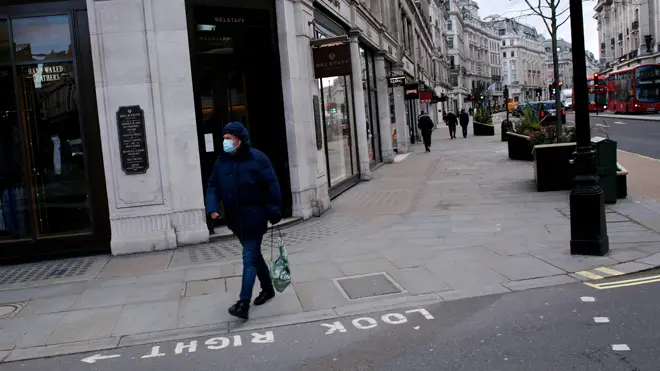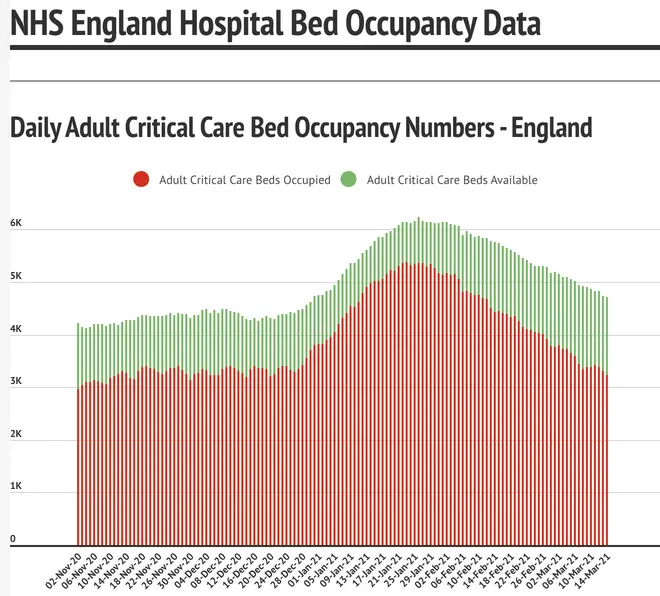
Iain Dale 7pm - 10pm
24 March 2021, 12:41 | Updated: 24 March 2021, 12:47

There can be no doubt we are winning in the fight against the second wave of Covid-19.
Going by almost every metric the numbers are tumbling.
On March 17, there were 437 hospital admission across the country. By comparison, as the second wave started to bite at the beginning of January, 800 people were admitted to hospital in London alone.
Meanwhile, in January more than 100,000 people were treated in hospital for Covid. As of the beginning of last week, there were just over 7,000 receiving treatment in hospital.
But despite this the Prime Minister has continued to urge caution and insist his roadmap out of the lockdown is the most optimistic timetable on offer, prompting criticism from his own side, namely Tory MPs in the Covid Recovery Group, that he has failed to get to grips with the other associated consequences of lockdowns on the economy, and society more broadly.

Steve Baker, deputy chairman of the CRG, believes ministers are missing an opportunity to give the hospitality industry a much needed boost by allowing beer gardens and outdoor cafes and restaurants to open up for the Easter bank holiday, instead of a week later on April 12.
“The sun is coming out, the vulnerable are getting vaccinated, but Easter is a major time for hospitality,” Mr Baker told LBC.
"That's a really massive cost for some of the younger and poorer people in our society, working in hospitality and they won't be able to get their businesses and livelihoods back on track at that time."
"At the moment, it looks like the data is better than anyone's best estimates. I do certainly think the Prime Minister should be willing, in following the data, to bring the plan forwards because of the costs of the plan."
Data compiled by LBC shows at the beginning of last week, there were just over 7,000 people in the UK being treated in hospital for Coronavirus. In France, there were 25,000, whilst in Italian hospitals were treating more than 27,000 people for Covid-19.
In Government, a stark choice is emerging. We can open up pubs, restaurants and shops. Life in Britain can return to relative normality.
But with Europe experiencing a devastating third wave of Covid-19, and both the South African and Brazil variants prevalent, the price of the grand re-opening at home will be summer holidays abroad.
The Prime Minister alluded to as much yesterday when he warned that given the rising number of cases in Europe, it was “certainly looking difficult for the time-being”.
The other key factor is the UK’s successful vaccination programme, compared to what is happening in Europe.
In the EU, just shy of 13 out of every 100 people have been given the jab, compared to nearly half of all people in Britain who’ve been vaccinated.
With the PM’s Global Travel Task Force due to report by the beginning of next month which holiday destinations if any will be given the go-ahead, it is of course a tense time for the travel industry.
But Professor Susan Michie, who sits on the SAGE committee of scientists which advises the Government, has said trade-offs will always have to be made when deciding which restrictions to lift and when to lift them.
She told LBC: “We have always had trade-offs. I think at the moment they are particularly acute because we are in a very risky situation where we have a partially vaccinated population.
“It means that as we go forward and hope to lift some of the restrictions, we really need to think about how do we prevent ourselves getting into a situation where the vaccine may be less effective for new variants and where there is a danger of R going above one and seeing exponential growth again?”
Given Labour is supporting the Government in its decision to extend restrictions contained within the Coronavirus Act by six months until September, political opposition from Tory MPs has been dealt with as tomorrow’s vote will only see a symbolic rebellion from Conservative members of the Covid Recovery Group, if anything.
But the broader question about what happens next is not going to go away.
And it is clear now that whilst there will be good news as parts of the lockdown will be lifted and life returns to relative normality, it will come at a price which could well include a significant limit on foreign holidays, or worse still, an outright ban.